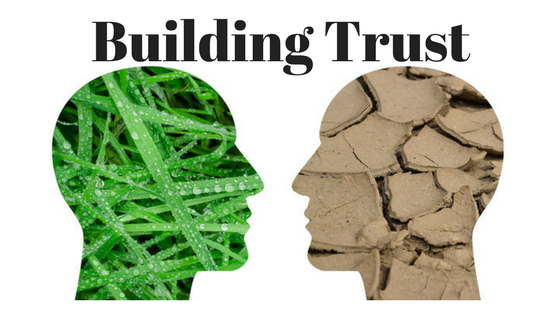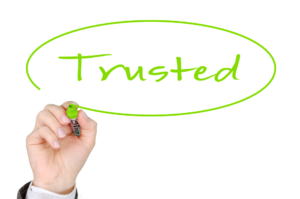
How do you go about building trust? I’m currently working with two executive directors who are new at their organizations, one small and one mid-sized. Both are exceptional leaders, excellent with donors, and have led other organizations. Building trust is at the top of their agenda. Their first task is to quickly build trust with board and staff, funders and donors, clients, partners, and stakeholders to effectively lead the organization through a transition that can shake an organization.
As executive directors, they feel that past behaviors that have proven successful will again carry them into this new organization. They know that leading others requires that they first trust you. Take action to overcome distrust: as Stephen Covey says, “My experience is that significant distrust doubles the cost of doing business and triples the time it takes to get things done.”
Building trust: Potentially turbulent waters
Your board of directors are the ones most likely to champion you. After all, they interviewed you and had an opportunity to get to know you and choose you to lead the organization. In fact, they are often excited about your vision, or your strengths in improving programs or fundraising.
But staff is often another story, especially if they are attached to the previous executive. Trust begins when you recognize that they want (and deserve) to be listened to, and be acknowledged for their work in the trenches. Remember, learning to interact productively with new people who have diverse ideas, styles, and preferences is a difficult challenge for everyone. Here are some things to consider:
- They might not tell you everything because knowledge is power. If possible, take the time to get to know them, and don’t start changing things immediately. Also remember, that staff might feel threatened by these requests and resist requests for information. They might resent changes to schedules and new meetings. Instead, ask how they would solve the problem of scheduling to bring you up to speed.

- Rather than giving them orders, give suggestions such as “you might consider . . .”
- They have “habit” patterns of doing things that work for them. Seek to understand why and how, and if change is really needed.
- Sometimes, its a simple difference of style between the previous director and you. Let’s face it, sometimes executives are ineffective at networking with those below them because they’re focused on the board and donors.
- Staff might not have been made accountable, or they may not have had annual goes tied to the strategic plan. So, suggestions for change from you need to aligned to how they are integral to achieving the mission, to living their own potential. What does success look like to them?
You can become the person who helps promote, accept, and make change happen. Your leadership effectiveness begins with you.
Building trust is a critical competency of leadership.
It is the one leadership trait that you need first, before anything else – your future depends on it. And, it’s a skill that can be learned, applied, and understood. It is something that each leader can get good at, measure and improve. You’ll need to build trust when you start, and you’ll need it to grow, change and lead into the future.
There are two ingredients to creating trust: character and competence.
Character means you have integrity, and you show others respect. And it also means you are responsible for your words and actions; you treat people fairly. Most people can immediately intuit your motives and intent with them. Thus, the foundation of trust is your own credibility. A person’s reputation is a direct reflection of their credibility, and it precedes them in any interaction.
How do you know you’re not trusted ?
Staff withhold information: They may do this for several reasons. However, it’s most likely that they’re withholding information because they are fearful of your reaction.
Solution: hold a team meeting or one-on-one meeting, make it clear what you need to know and why. Openly ask if there any concerns they have in disclosing information to you. Give them an example of a recent incident where information was not disclosed. Then, ask them what would have to change to make it easier for them to disclose information when you need it. Reinforce that want to build strong open relationships with everyone and that you are always open to feedback. This is step one in building trust.
They are disrespectful: Staff show this by not following direct orders; or they don’t complete tasks on time; worse, they try to discredit you; or they completely ignore your requests.
Solution: hold a team meeting. Tell them you’ve observed behaviors from the staff that is really impacting achieving results, and you’d like to understand why. Ask to hear their solutions. Allow them to talk. Stay calm. Don’t interrupt or get defensive. When you decide what you will implement, share your decision with them. You don’t have to agree with all of them. You will build trust quickly when you show that you have listened to them, you have taken their opinions into account, and are implementing the solutions they have suggested. [You also might not implement their suggestions – make sure to thank them, and let them know what your concerns are about their solutions. They will still feel heard.]
The staff is guarded and keep to themselves.
Solution: Actually, this is pretty normal. So, make the first move – they’re waiting for it. Be personable and friendly – smile and find opportunities to chat, have lunch, and give them an opportunity to get to know you.
So, how might you approach building trust?
- Talk straight – be transparent – clarify expectations
- Demonstrate respect – listen and clarify – extend trust first
- Right wrongs as you become aware of them
- Keep commitments and walk the talk
- Show loyalty to staff when tough situations arise
- Be accountable.
- Recognize and celebrate achievement.
- Be willing to talk about the importance of learning and that we learn from our mistakes.
- Remember that you can’t do it alone. Keep focused on getting to know each of them better.
- Keep showing that you are there for them and want them to succeed.
I’d be interested in knowing what ways you are building trust with your staff. Please share in the comments below!




